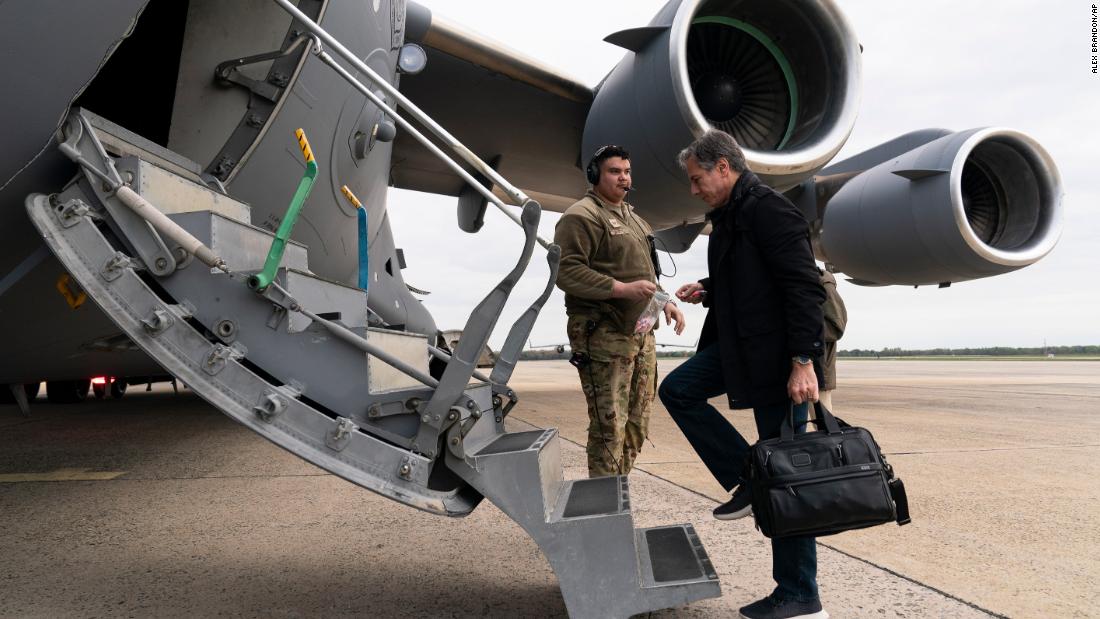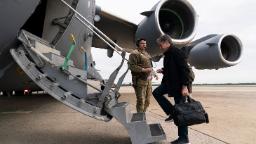

While in Kyiv, Blinken and Austin met with Zelensky, Foreign Minister Dmytro Kuleba, Defense Minister Oleksiy Reznikov and Interior Minister Denys Monastrysky for an extended, roughly 90-minute bilateral meeting, a senior State Department official said.
During the visit, Blinken relayed that US diplomats would return to Ukraine this week, the senior State Department official said, characterizing the move as a strong message of solidarity from the United States.
Blinken and Austin also discussed the Biden administration’s intention to provide $713 million in additional foreign military financing to help Ukraine transition to NATO-capable systems, according to the senior State Department official and a senior Defense Department official, as well as deliveries of recent US military assistance to Ukraine and the ongoing training for Ukrainian soldiers.
Both officials briefed press who traveled to the region shortly before Blinken and Austin were due to arrive in Kyiv; the traveling US press corps did not travel with the secretaries to the Ukrainian capital.
They also discussed efforts at diplomacy the Ukrainians are undertaking with the Russians, the senior State Department official said.
In the background briefing, the officials made clear that the US military would still not be involved directly in the war.
“The President has been very clear there will be no US troops fighting in Ukraine and that includes the skies over Ukraine,” the defense official said, adding, “This visit does not portend actual involvement by US forces.”
While officials hailed the trip as a testament to the US commitment to Ukraine, they have also faced questions about why Biden did not make the trip himself.
“The President of the United States is somewhat singular, in terms of what travel would require. So it goes well beyond what a Cabinet secretary would or what virtually any other world leader would require,” the State Department official noted.
UK Prime Minister Boris Johnson visited the country earlier this month. Top officials from the EU and the Baltics have also visited Zelensky in Kyiv.
As part of the resumed US diplomatic presence in Ukraine, diplomats will “start with day trips into the Lviv” and “will graduate to potentially other parts of the country and ultimately, to resume presence in Kyiv,” the senior State Department official said.
Blinken and Austin’s visit came as the first tranche of about 50 Ukrainians will complete artillery training in a country outside Ukraine, the defense official said. Another tranche of about 50 Ukrainians will also begin training soon, the defense official said.
“The first tranche of artillery training is complete,” Pentagon spokesperson John Kirby told reporters Sunday who traveled to the region with the secretaries in a briefing in Poland. “We train soldiers that will go back, and their colleagues will be able to follow and be all in on systems.”
Some of the howitzers included in the most recent military assistance package for Ukraine are already in the country, the defense official said. The howitzers are expected to be effective at this stage of the war as it’s shifted to the Donbas, where the terrain is suited to “long range” weaponry, Kirby said.
Kirby noted the speed with which the military assistance shipments has arrived in Ukraine and said that the decision for how to deploy the assistance is up to the Ukrainians.
“It’s not taking more than 24 to 48 hours depending on what’s being shipped and the availability of ground transportation to get it into Ukraine,” Kirby said. “As we’ve said before, when (the assistance is) transferred to Ukrainian hands, it’s Ukrainian property, and we are not dictating to them how fast they get it to the front line or what units get them.”
Military officials described to reporters the ongoing concern among NATO countries about the threat that Russia poses to them.
“Not just here in Poland, I think many of the countries are concerned about Russia’s next steps,” said Lt. Gen. John Stephen Kolasheski, the commanding general of V Corps in Poland. “And are very pleased to have the US military here working side by side — helping them develop their capabilities and capacity. … I think they are recognizing that Russia is currently and will be a threat in the future.”